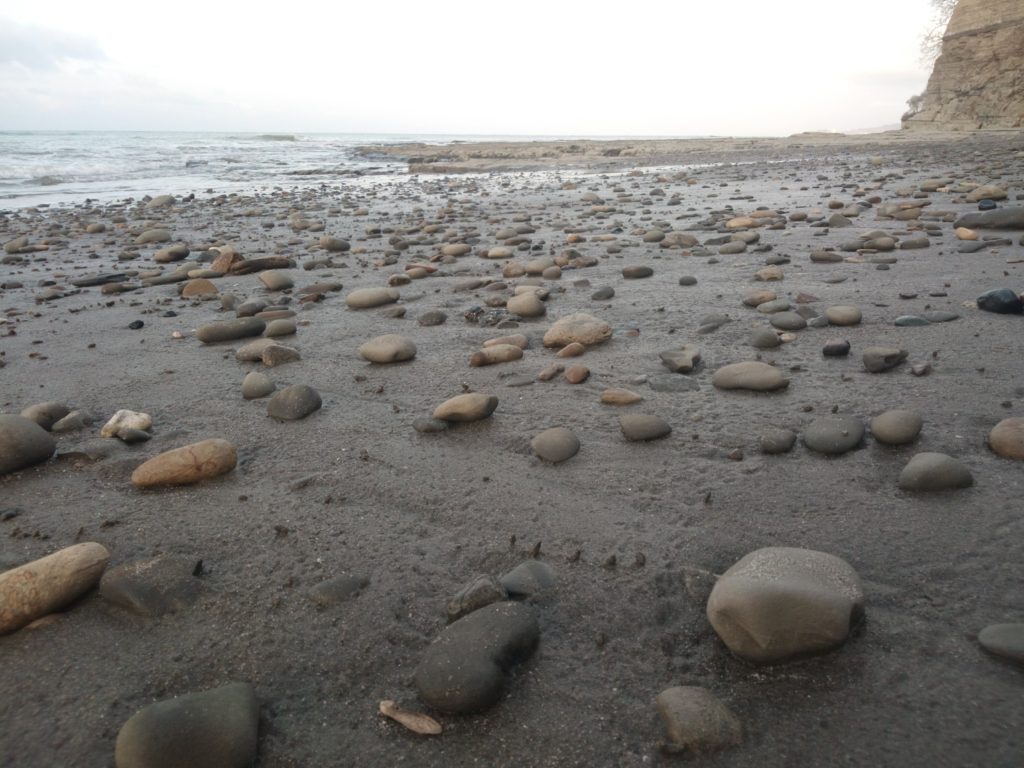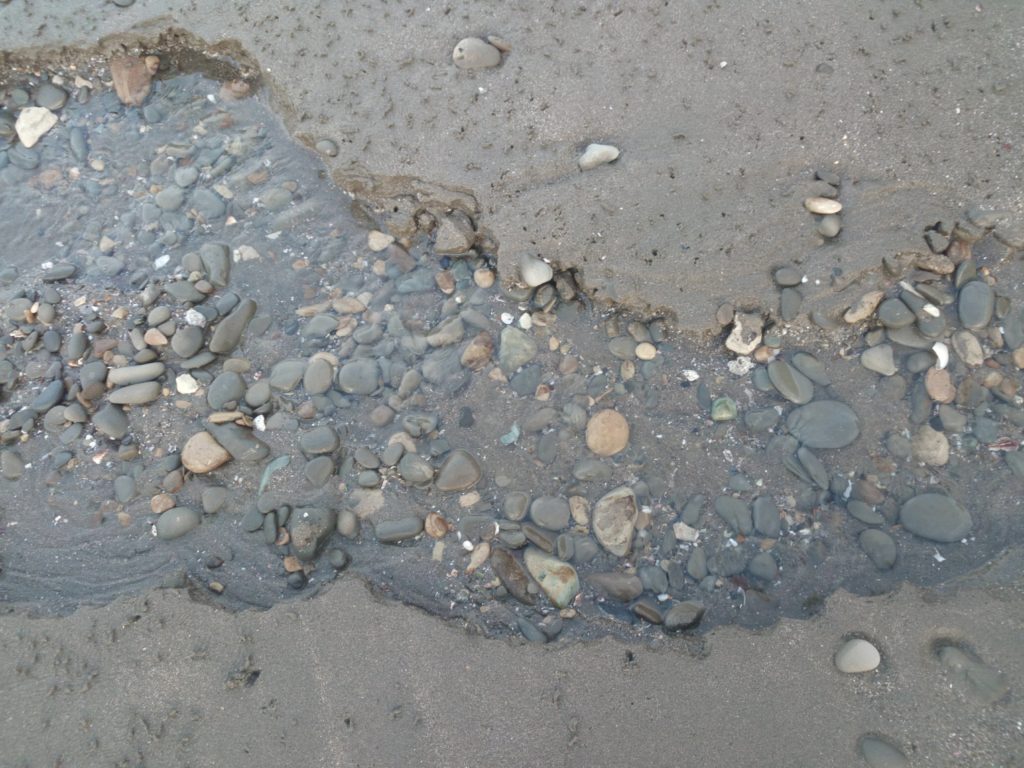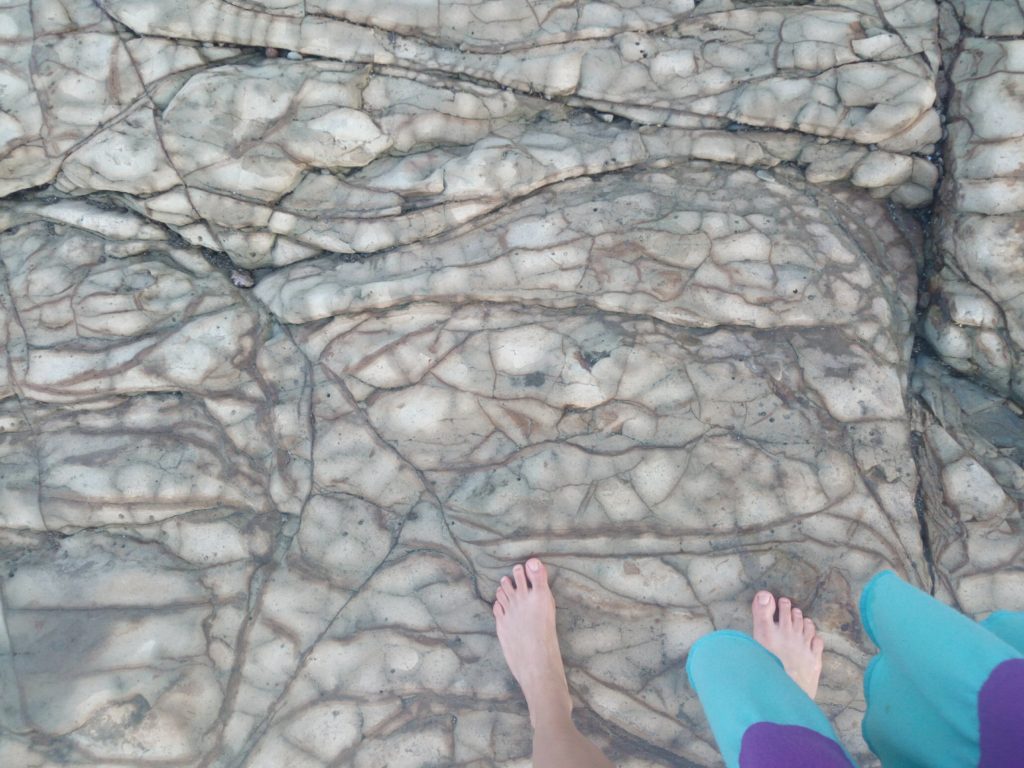
Andy and I are walking down a busy stretch of beach on the Ecuadorian coast: vendors sell snacks on the sand as children scamper in and out of the turquoise waves at the edge of the vast expanse of the Pacific. A moment or two after entering an empty section of the beach where the long line of hotels and guesthouses gives way to sheer cliff face, we hear yelling behind us and turn to see what’s happening. It takes a second or two to comprehend.
It doesn’t seem real.
But there they are: two men with faces covered in black balaclavas, machetes held high over their heads, sprinting toward us from a mere twenty feet away.
The vision sinks in. We turn and run as fast as we can, but it won’t be fast enough.
Adrenaline surges through my veins. I am fear with legs, and while the animal of my body instinctively flees the threat, my brain processes everything in an instant: They might rape me. They might kill us. This might be the end.
There is an unclimbable wall of rock to our left, and the ocean to our right–into which we could try to escape, but there would be no advantage in struggling against our attackers in water up to our necks. They could drown us, butcher us with their three-foot-long blades. Stretching ahead of us, there’s nothing but empty beach for about a mile, so we can’t outrun them–if we try, they may tackle us with their machetes, and that will not end well.
“Stop!” I call to Andy. “Let’s just stop and give them what they want.” And let’s hope that all they want is what we’re carrying.
We wait, looking at each other. Looking behind us. In seconds, they’re upon us, yelling and threatening us with their weapons. Mostly, they swarm Andy, who is wearing the backpack and has the cellphone and wallet in his pockets. They move the machete back and forth impatiently near his arm, still yelling, as he reaches into his front pocket to dig out the wallet. I say something to him in English, maybe hurry up or let them get it. I am terrified that they will slice his arm, or his neck.
Then they have the backpack and Andy’s pockets are empty. “Este es todo, es todo,” I tell them. My voice is loud. Reasonable. Calm, in a way–but laced with fear; seeking to appease. (I may have said, “por favor.” I can’t remember. My entire consciousness was screaming, please don’t hurt him! Please leave us alone now! But I don’t know whether those pleas were translated into words.)
Now the men look at us again. Hold up their machetes. “¡Va!” they yell. “Go!”
We turn to move and one of the men makes another threatening movement in the air with his blade. “¡Corriendo!”
And we run. We run, and see our attackers running back in the opposite direction, further down the desolation of the empty beach. Andy catches a glimpse of them scrambling up a hidden path along the cliff from which they apparently descended, and suddenly I can no longer run. I walk doubled over through the loose sand; I am going to be sick. But then, instead of vomiting, I erupt into uncontrollable sobs. Andy is calm and consoling.
Afterward, Andy’s hands shake as he dials our bank to report his stolen credit and debit cards, and as he quickly types out new passwords for all of our online accounts from a hotel computer, but he does not cry. He does not re-live the event, over and over, for the next several days, he does not come down with a debilitating gastrointestinal illness by the end of the day, and his body does not lose its ability to regulate temperature for over a week, succumbing to either an erratic, low-grade fever or a fight-or-flight response on repeat. (These were the ways my body responded to what I experienced as an existential threat.)
Andy tells me later that it did not enter his mind that the men on the beach might rape me or kill us.
This fear, I believe, is one of the key differences between moving through the world as a man and moving through the world as a woman. I have been afraid of being raped–and possibly murdered–as far back as I can remember. It was a learned fear, directly taught by my mother and other concerned adults who wanted to make sure I knew which kinds of situations and men to avoid in order to keep myself safe. During my childhood, when a little girl a few years older than me was kidnapped and murdered in my sleepy small town, these fears were further cemented. But as the years went on, my friends and I had our own firsthand experiences with threatening men and boys to reinforce our sense of vulnerability; to remind us that we were rapable.
Sometimes this has meant having strangers yell their sexual intentions directly at me on the street; other times it comes in the form of objectifying comments, or being groped and grabbed. A couple of times, I have even been followed–once, in Buenos Aires, I ran and hid in a churchyard, my heart pounding in my chest, as the man who had been trailing me entered the churchyard, too, and looked around for awhile before finally losing interest and leaving. Over the course of my 29 years, I’ve experienced sexual harassment in my high school classroom, at work, while getting a massage… you name it.
These experiences vary in their intensity, and yet all of them–large and small–are linked together because I subconsciously recognize that they exist along a continuum of sexual exploitation and violence. They all signify the same terrifying reality that these men feel entitled to women’s bodies–to my body–and there’s no way for me to predict how far they might take that sense of entitlement in a given situation. Rape and sexualized murder lie at one end of the continuum, and this knowledge means that my various experiences of lesser degrees of harassment, assault, and violation exist within the context of that looming threat.
The armed robbery on the beach in Ecuador and the difference between Andy’s and my experiences in the same high-stress situation is illustrative of the fact that although both men and women (not to mention children of both sexes) are impacted by male violence, gender still largely determines its impact and frequency. As the #metoo campaign has made clear, male violence in its various forms–and the rape culture that condones and upholds it–is not a matter of deviant behavior by a few “bad apples” on the fringe, but rather a reality woven into the fabric of our society as a whole–present in our daily lives, workplaces, and relationships.
The prevalence of all this is no revelation to any of the women I know, but at least in my community here in Vancouver, all the recent publicity around sexual assault and harassment has sparked useful conversations, especially between women and men.
Although ending male violence will require transformation on a political, cultural, and systemic level, that transformation will never come without change in our interpersonal relationships and individual perspectives, so I am convinced that it must begin on a deeply personal level. Addressing rape culture and male violence is, first and foremost, spiritual work.
The change that is needed will involve more than an ideological shift, or legislated progress. Courageous, committed women have been resisting and working to end male violence for generations, but change will also require vulnerability, humility, compassion, and courage on the part of men who commit themselves to joining with us as allies to become part of the solution. For men, joining the struggle will mean men opening themselves up to being challenged, and being changed.
I see this happening around me, and I am heartened. I appreciated a recent blog post by the youth pastor at our church, in which he bravely articulated the fact that even as a victim of male violence himself, he has also been responsible for upholding and benefiting from rape culture in various ways. His vulnerable reflections expressed, eloquently and with nuance, the differences between his experience of sexual assault and those of female survivors for whom the continuing threat of repeated violence continues to shape day-to-day life on an ongoing basis.
I’ve also appreciated the way that my husband and other men in our church community, after taking the time to listen to the stories of the women around them, have begun meeting together for conversation and learning about male violence and the toxic versions of masculinity that our culture teaches. They are seeking to engage in the hard work of uncovering and uprooting these things in themselves; challenging one another to grow into healthy masculinity and to interrupt and resist both the overt and insidious patterns of violence at work in their relationships, workplaces, and wider community.
We are still at the beginning of a long journey, but I so appreciate the willingness of these men to listen, to take responsibility for their own thoughts and actions, and to engage with these issues even when it’s uncomfortable–understanding that the women around them don’t have the luxury of choosing whether or not to pay attention.
My heartfelt request to all the men in my life is to stand alongside me as a woman by doing the same.

